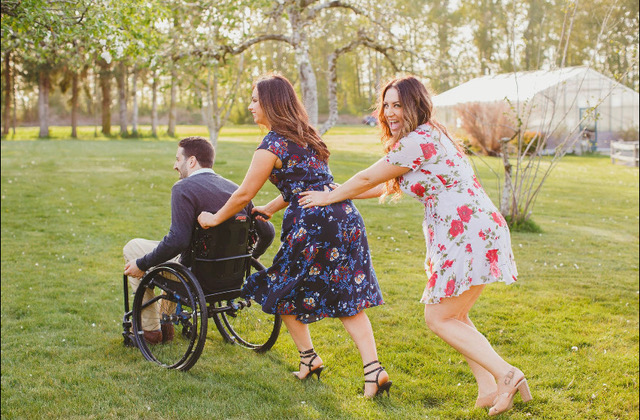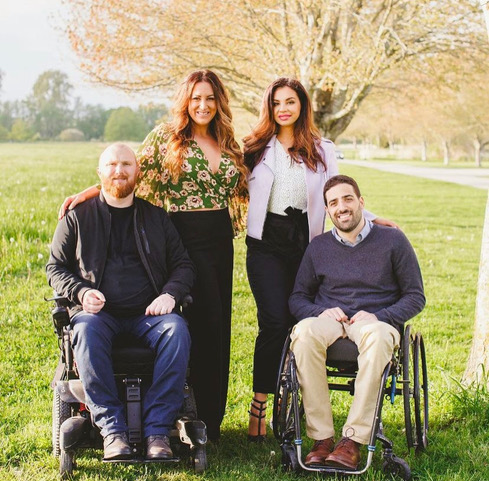By Codi Darnell
April 13, 2021
Every relationship has its quirky irregularities that feel unique to a couple. But when the inner-workings of your partnership go beyond small, unconventional differences – such as when your partner has a spinal cord injury – it can become isolating. You turn to Google, typing in questions to help you find someone who gets it, someone who can prove to you that you aren’t alone. However, what if those people aren’t easy to find? When two women from Vancouver, BC found themselves in this situation, they decided to do something about it and Wives and Girlfriends of Spinal Cord Injury – better known as WAGS of SCI – was born.

Brooke Pagé and Elena Pauly met in the aftermath of their respective partners’ spinal cord injuries. Those injuries thrust both women into new relationship territory. But as they stepped into their new dual role of romantic partner and caregiver, they struggled to find resources that would help them navigate their situation and find balance. After the two of them connected, they became fast friends and realized that having the support and understanding of another person on the same path provided a connection they desperately needed. They soon decided that they didn’t want another woman to go through the caregiving experience alone and went to work establishing a community.
Since creating WAGS of SCI, Brooke and Elena have connected couples around the world. Looking through their website and social platforms, you can see that their community is what they are all about. They are dedicated to providing resources, support and connection to both women and their partners through their website, podcast, social channels, fundraising efforts, and more.
I’m so happy that Brooke and Elena agreed to be featured in this week’s blog post. I think the work that they do is important and that they are not only doing wonderful things for the women who support their partners with SCI, but for the SCI community as a whole.
Why was it important to you to create a group that was specifically for women in the caregiving role and not for both men and women?
We have always stayed true to who we are – people who identify as women and happen to have partners with SCI. The cold hard truth is that 80% of spinal cord injuries happen to men due to various reasons, so there is a community of women out there who are in need of support while they go through this injury alongside their partners. When we both went through the rehab system with our partners, we felt alone and cast aside even though we also needed resources and support in order to adapt and assist our partners in our new life together. We always talk about how after everyone goes home – friends, family, loved ones – we are the ones there. We are the ones supporting our partners and seeing the good, the bad and the ugly sides of SCI. We know that there are a lot of programs for the injured person in rehab and in the community, but there was nothing exclusively for us.
Everything at WAGS of SCI, from content creation to advice and beyond, comes from our perspective. We would never claim to speak for male caregivers as their ideas, thoughts, and issues may be very different than ours; we can only speak for ourselves. We have maintained this over the years as we believe that our niche is very important and deserves a unique and independent voice. The things women go through as caregivers need to be highlighted and put in the forefront. We have been asked why we haven’t started a group for male caregivers many times in the past, and we have always told the people who ask this to please feel free to start a group focusing on male caregivers! We would love for someone who sees the caregiving life through a male lens to start this. There is always room for more awareness and more groups like ours with different perspectives. That is the beauty of the online community.
Do you believe the benefits of WAGS of SCI go beyond the caretaker in the relationship?
 We are proud to have many different followers in our group with different perspectives and abilities. We have a lot of single male followers who hope to someday have a relationship after a SCI. We have been told that our group and social accounts give them much needed hope that love is possible for them someday. They have told us that they get valuable insight into the world of a WAG and have become more understanding about caregivers and partners and their needs.
We are proud to have many different followers in our group with different perspectives and abilities. We have a lot of single male followers who hope to someday have a relationship after a SCI. We have been told that our group and social accounts give them much needed hope that love is possible for them someday. They have told us that they get valuable insight into the world of a WAG and have become more understanding about caregivers and partners and their needs.
We also have a lot of female followers who use wheelchairs and who love to participate in our discussions of inclusivity. They have told us that they support what we are doing as it creates more awareness for the disabled community as a whole from a perspective that is not as common. And awareness is our #1 goal.
We also have many women who are not caregivers to their partners but are still WAGS of SCI and are contributing active members of our group. Like it or not, even those who have partners that are fully independent do still need some help with dealing with various aspects of this life, like accessible design, advocacy, mental health, and more.
You two often tackle topics that make some people uncomfortable. For instance, one of your recent podcasts talked about the often-taboo subject of devotees. From sex to bathroom routines to devotees, why do you believe it’s important to have these conversations?
We love to highlight topics and issues that are not commonly discussed. We don’t really have a filter, and our podcast is the perfect place to discuss more “taboo” topics without needing to censor ourselves. When we first began WAGS of SCI, we saw that the community as a whole could be very sterile and somewhat hidden when it comes to the real aspects of the SCI life, and we wanted to change that. Instead of keeping these topics in the dark, we have tried to bring them into the spotlight to create more discussion and inclusivity. One of our goals has always been to expand people’s minds and create more love and support without hiding. We also created the #WAGSofSCIREALLIFE hashtag for our followers to post their stories about what life is really like post-SCI or living the caregiving life. This helps to show people that they are not alone with the milestones, celebrations, struggles and real situations that you sometimes have to laugh your way out of to stay sane.
You have come up with different fundraising initiatives for WAGS of SCI. Can you explain how you use those funds and the ways it benefits your community?

The funds we gather all year go to our couples. When we were in the initial stages of adjusting to life with SCI with our partners, going on a date night was nearly impossible financially even though we knew how desperately needed they were. We also believe that you cannot pour from an empty cup and that self-care is necessary. But with the financial burden of disability, the excess funds to help with these important facets of life aren’t always there. That is why we started fundraising.
We began fundraising by picking up pop cans off the streets. Our first donation went to a couple in Africa – with the $100 date night, they were able to stay at a resort and truly forget their worries for one night. It was incredible and really reiterated how important it is for couples to connect.
Since then, we’ve created the WAGS of SCI Self Care Run, we sell merchandise, and we accept donations to help our couples get out together, whether that means getting couples out the door to go rekindle that spark at dinner or a weekend away.
We also support our women so they can get time for themselves, such as organizing a food delivery service, or covering a cleaning bill or the cost of having a nanny come in to care for children so that mom can take care of herself. We want to help our community feel supported when they need it.
Our fundraising supports all of those initiatives because we know that love and relationships are possible – sometimes they just need a little extra help.
What has surprised you in the process of establishing and growing this community?
To be honest, that a group like this didn’t exist. We thought for sure that by now we’d stumble across a support group for partners of people with SCI, but there isn’t one. It’s still quite shocking the initial rehab centers didn’t and don’t have one.
Also the lack of accessibility and knowledge from friends and family – like being invited places that don’t work for our partners. It’s always really fascinating.
I guess the other thing is how willing the government and health care system is to use spouses to pick up the reins. We both know how incredibly difficult it was to take on the role of caregiver to our quadriplegic partners, and to have zero compensation so you can also take care of yourself is just wrong. We are actively working in our community with our Members of the Legislative Assembly, personal injury attorneys and local advocates to shine a light on this issue. A spouse shouldn’t be left in the dust without the recognition of having to wear many hats as their partner heals and adjusts – we are only human.
How can someone help support the work you are doing?
We would be so thankful if the conversation doesn’t just stop here! Talk to your friends and family about accessibility, about SCI, and about the spouses who are there too. You can check out our website where you can access all of our social media pages and our WAGS of SCI podcast which has a ton of really great information! Or, write in, ask us questions, and get involved! We would truly love to hear from anyone who is curious and no questions are off limits. And just know that by participating in any of these things you are making an impact. We see you and we hear you, and we know together we can bust the stigmas around SCI, love and relationships.
Thank you very much for taking the time to get to know us a little better.
